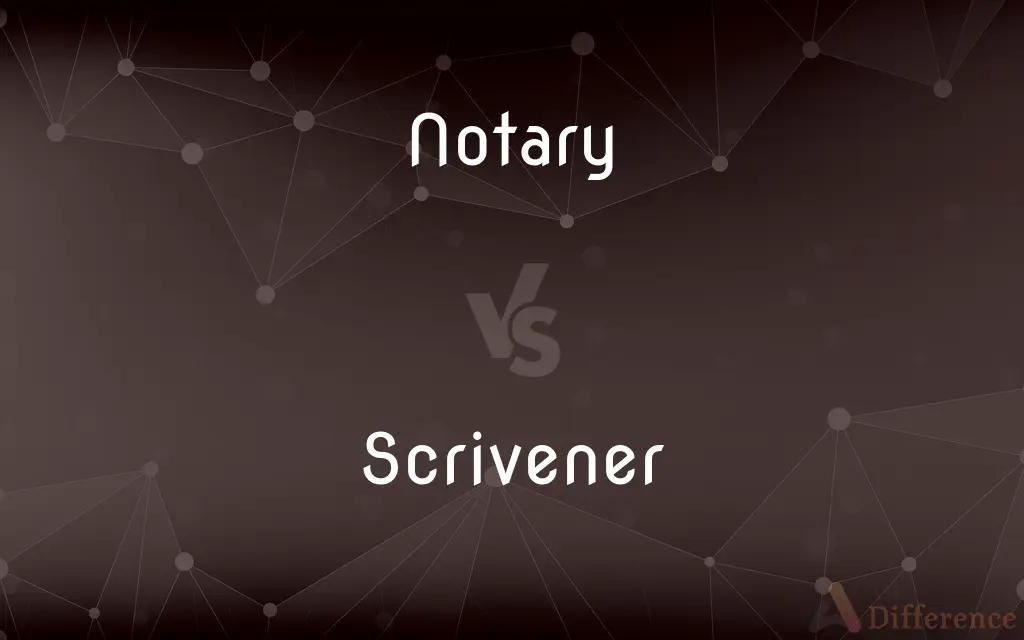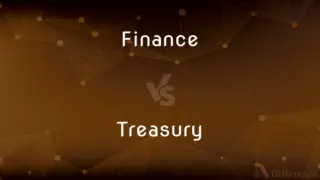Notary vs. Scrivener — What's the Difference?
By Urooj Arif & Maham Liaqat — Updated on May 4, 2024
Notaries are legally authorized to witness signatures and administer oaths, while scriveners primarily focus on handwritten document preparation and transcription.

Difference Between Notary and Scrivener
Table of Contents
ADVERTISEMENT
Key Differences
Notaries are officially commissioned by state governments, which allows them to perform legal formalities such as witnessing signatures and administering oaths. Whereas scriveners, often seen as historical figures, specialized in the manual copying of documents before the invention of the printing press.
Notaries are essential in legal transactions, ensuring the authenticity of signatures and documents. On the other hand, scriveners were historically important for preserving literature and legal records when copying was done entirely by hand.
Notaries operate under strict legal guidelines and their services are crucial in many legal processes such as mortgage closings or the signing of power of attorney documents. In contrast, scriveners' roles have diminished with advances in printing and digital technology, but they still exist in some legal contexts, particularly in countries like Japan.
Notaries must undergo specific training and certification to offer their services, ensuring they understand legal implications and procedures. Scriveners, however, often learned their trade through apprenticeships focusing on meticulous writing and document handling skills.
In modern times, notaries provide services that are essential for the validation of many legal documents, ensuring they are executed properly. Scriveners, although not as commonly employed today, continue to serve in niche markets where traditional document preparation is valued.
ADVERTISEMENT
Comparison Chart
Definition
A legally authorized official
A professional writer of documents
Primary Role
Witness signatures, administer oaths
Handwrite and transcribe documents
Historical Relevance
Remains highly relevant today
Mostly historical, except in certain regions
Training and Certification
Required legal training and certification
Often learned through apprenticeship
Modern Usage
Essential in legal, real estate transactions
Limited, specialized use in document preparation
Compare with Definitions
Notary
An official who serves as a witness to the signing of important documents.
A notary was required to witness the signing of the mortgage papers.
Scrivener
Historically, a clerk, scribe, or notary.
The scrivener spent hours meticulously drafting legal documents.
Notary
A public officer licensed to perform acts in legal affairs, particularly witnessing signatures on documents.
The notary public verified her identity before notarizing the documents.
Scrivener
A person who writes out deeds, letters, and other documents.
In medieval times, a scrivener was often tasked with copying entire books by hand.
Notary
A person authorized to perform legal formalities, especially to draw up or certify contracts, deeds, and other documents for use in other jurisdictions.
We needed a notary to certify the copies of our company's incorporation.
Scrivener
An old term for a clerk who has charge of writings or accounts.
The office's scrivener was responsible for maintaining all the financial records.
Notary
A legal officer with specific judicial authority to certify legal documents and statements.
The lawyer directed her to a notary to get her affidavit authenticated.
Scrivener
One who writes or constructs documents.
The scrivener worked closely with the lawyer to ensure all documents were accurately prepared.
Notary
Someone legally empowered to witness signatures and manage formal documents.
They appointed a notary to handle the estate documents.
Scrivener
A scrivener (or scribe) was a person who could read and write or who wrote letters to court and legal documents. Scriveners were people who made their living by writing or copying written material.
Notary
A notary is a person authorised to perform acts in legal affairs, in particular witnessing signatures on documents. The form that the notarial profession takes varies with local legal systems.The Worshipful Company of Scriveners use an old English term for a notary, and are an association of notaries practising in central London since 1373.
Scrivener
A professional copyist; a scribe.
Notary
A notary public.
Scrivener
One who drafts legal instruments such as contracts and wills.
Notary
A lawyer of noncontentious private civil law who drafts, takes, and records legal instruments for private parties, and provides legal advice, but does not appear in court on his or her clients' behalf.
Scrivener
A professional writer; one whose occupation is to draw contracts or prepare writings.
Notary
(common law) A public notary, a legal practitioner who prepares, attests to, and certifies documents, witnesses affidavits, and administers oaths.
Scrivener
(obsolete) One whose business is to place money at interest; a broker.
Notary
A notary public, a public officer who serves as an impartial witness to the signing of important documents, but who is not authorised to practise law.
Scrivener
A professional writer; one whose occupation is to draw contracts or prepare writings.
The writer better scrivener than clerk.
Notary
One who records in shorthand what is said or done; as, the notary of an ecclesiastical body.
Scrivener
One whose business is to place money at interest; a broker.
Notary
A public officer who attests or certifies deeds and other writings, or copies of them, usually under his official seal, to make them authentic, especially in foreign countries. His duties chiefly relate to instruments used in commercial transactions, such as protests of negotiable paper, ship's papers in cases of loss, damage, etc. He is generally called a notary public.
Scrivener
A writing master.
Notary
Someone legally empowered to witness signatures and certify a document's validity and to take depositions
Scrivener
Someone employed to make written copies of documents and manuscripts
Common Curiosities
Are notaries still relevant in digital times?
Yes, notaries are increasingly using digital platforms to perform electronic notarizations.
What kind of training does a notary require?
Notaries typically undergo a certification process which includes training on legal document handling and ethics.
Can a scrivener legally certify documents?
Traditionally, a scrivener could not certify documents unless they also held a specific legal authority.
What is the historical significance of scriveners?
Scriveners played a crucial role in historical document preservation and were essential before the advent of printing technology.
Can a notary and a scrivener perform the same functions?
No, notaries are legally authorized officers, while scriveners are primarily focused on document writing and transcription.
How does one become a scrivener?
Historically, becoming a scrivener involved apprenticing under a skilled practitioner to learn the craft.
Do scriveners need any official certification today?
In some legal contexts, yes, but generally, they are considered more of a skilled trade.
What legal powers does a notary have?
A notary has the power to witness signatures, administer oaths, and certify copies of documents.
Are scriveners still employed today?
Yes, but mainly in specialized areas such as legal document preparation in Japan.
What is the main difference in the role of a notary in the US compared to other countries?
In the US, notaries mainly witness documents, while in some countries, notaries can also draft contracts and perform legal functions.
What are typical documents a notary might handle?
Wills, mortgage documents, contracts, and power of attorney forms.
What tools does a scrivener use?
Historically, scriveners used quills and ink; today, they might use more modern writing tools.
Can a scrivener act as a witness in document signing?
This depends on the jurisdiction and the specific legal stipulations in place.
Is a notary's certification accepted internationally?
It depends on the document and the countries involved; sometimes additional legalization like an apostille is required.
How has the role of the notary evolved over time?
From simple document witnessing to more complex roles involving fraud prevention and electronic documentation.
Share Your Discovery

Previous Comparison
Finance vs. Treasury
Next Comparison
Wiki vs. WikipediaAuthor Spotlight
Written by
Urooj ArifUrooj is a skilled content writer at Ask Difference, known for her exceptional ability to simplify complex topics into engaging and informative content. With a passion for research and a flair for clear, concise writing, she consistently delivers articles that resonate with our diverse audience.
Co-written by
Maham Liaqat















































